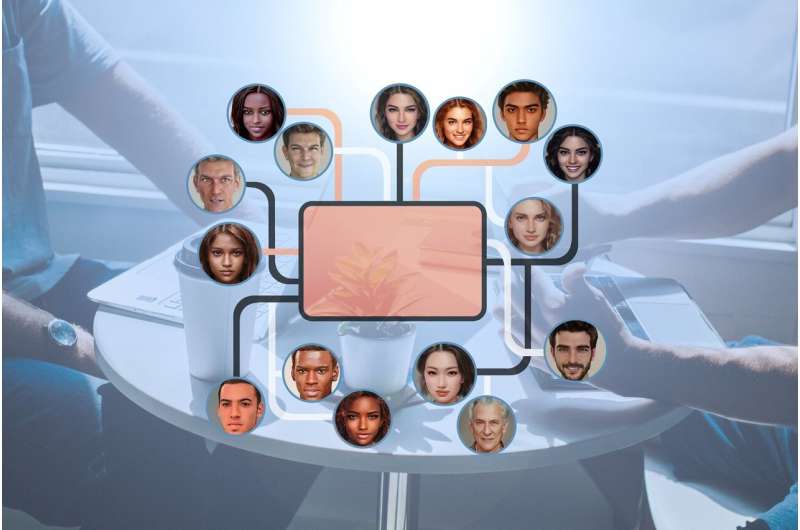Online focus groups effective in data collection for low-income and minority populations

Online focus groups are an effective way to gather data while also reducing barriers faced by people in low-income and minority groups, according to researchers at The University of Texas Health Science Center at Houston (UTHealth Houston).
The study was published in the International Journal of Qualitative Methods.
Researchers cited a reduction in both resources needed and barriers to participation, while maintaining high-quality data collection in their findings.
Daphne Hernandez, Ph.D., associate professor at Cizik School of Nursing at UTHealth Houston, was in the middle of a study using in-person focus groups as a means to gage the effectiveness of a food distribution program that provided community college students with fruit, vegetables, dry goods, and meat when COVID-19 stay-at-home orders began. Hernandez and the research team were faced with a dilemma: either halt the study or find a solution that would allow them to continue while keeping everyone safe.
"We were in the middle of doing traditional focus groups, face to face, when the pandemic hit, and we did not want to stop data collection," said Hernandez, Lee and Joseph Jamail Distinguished Professor in the School of Nursing. "We had a good momentum going and did not want to put people at risk."
While the idea of an online focus group is not new, the research team had concerns about decreased participation and lower quality of data collection. However, their findings debunked these claims while also revealing unexpected benefits for the researchers and the participants.
"I felt like I was doing an experiment within the study and was surprised to see a positive response," Hernandez said. "With in-person focus groups, we had a lot of challenges with getting people to show up, so we were pleased to have focus groups go online, and it meant we could continue the study."
First, the researchers found that they could recruit participants and collect data with few or no changes. The number of individuals recruited in person stayed the same for the online focus groups and they had a similar demographic background as the participants in the in-person focus groups. Also, the content of the focus groups did not change. The researchers were able to provide the same questions and record quality responses in the online format.
The researchers also found a reduction in resources needed to conduct the online focus group compared to in-person focus groups.
"There is an increased cost to in-person focus groups when compared to online," Hernandez said. "In person, we will compensate participants for parking, and there are also costs to feed the participants or provide snacks in addition to compensating them for their time and participation. With online focus groups, the food and parking compensation are not needed."
The study participants had a reduction in resources needed to participate. While evaluating the parent study that focused on the food distribution program, some participants cited transportation as a barrier to picking up the food items. The researchers also stated that transportation was why participants failed to show up to the in-person focus groups, causing the cancelation of some focus groups throughout the research.
"When we were analyzing the food distribution program data, we identified that some students frequently attended and others did not," Hernandez said. "Low attendance to the food distribution program was related to not having transportation; they either had to rely on someone else or not attend the program. This transportation barrier then spilled over into attending the in-person focus groups."
Lastly, the researchers suggested this method is effective not only for COVID-19, but also when working with lower-income or vulnerable populations, due to reduced barriers and increased flexibility in participation.
"During the online focus groups, our preference was for participants to have their video on because it allowed for nonverbal communication. But, the platform does allow people to turn their camera off if they don't feel comfortable in a group setting," Hernandez said.
Online focus groups also gave the researchers more options for when to schedule focus groups to allow the most participation.
"When we held the focus groups in person, we would usually have them during the weekend because it was the best time for our participants, who would likely be working during the week. For the online focus groups, they could join in the evening from the comfort of their home. All they needed was access to the internet," Hernandez said.
With the advent of technology, more people have access to Wi-Fi on their computers or cellular data on their phones. Hernandez is hopeful about what these findings will mean for future qualitative studies.
"I think applying an online video platform to collect data from focus groups is a good method when working with lower-income, vulnerable populations," Hernandez said. "We will continue to use this method to reach underrepresented groups."
More information: Chinyere Y. Eigege et al, Conducting Research Six Feet Apart: The Feasibility of Transitioning Qualitative Research to Meet the Emerging Research Needs During a Pandemic, International Journal of Qualitative Methods (2022). DOI: 10.1177/16094069211069442



















